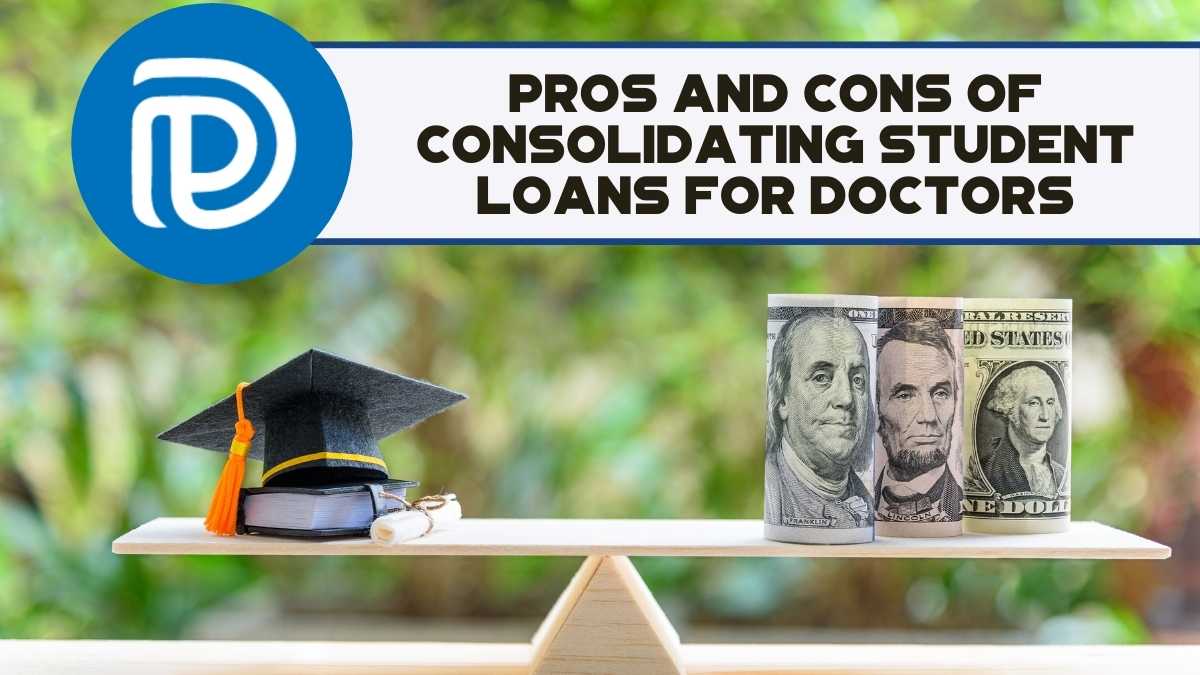One of my tennis partners is also a local surgeon. His daughter is a LSU medical student also aspiring to become a surgeon. I recently spoke with her and her boyfriend (also a medical student and good tennis player too) recently. They were excited about finishing up their first year of school (especially gross anatomy).
As you can imagine, our conversation turned towards their finances. Both were carrying student loan debt and a question came up about debt consolidation once they were ready to start repayment.
Most dental and medical students don’t pay much attention to their student loans while in school (I know I didn’t). Unfortunately, this can severely damage your financial future and delay financial freedom.
With dental and medical student loan debt skyrocketing these days, it’s important to pay attention to the conditions and amounts you’re borrowing.
Once you’re ready to start the payback process, you should be aware of the pros and cons of consolidating student loans.
Before we get into that, let’s briefly discuss the current student loan debt situation…
Average Medical And Dental School Debt
Both dental and medical school graduates tend to have larger student loan balances versus those pursuing a bachelor’s degree. Why? Time in school. After four years of college, both medical and dental schools require another four years of education.

For either that want to further their education by attending a residency program, they can expect anywhere from 2-8 more years of training.
Yours truly attended four years of dental school (LSU), a one year general practice residency (VA hospital), followed by three years of periodontal training.
During that eight year period, I racked up over $250,000 of debt. Luckily my undergrad was paid for by scholarships and my parents.
These days, I’d suggest 529 plans to cover undergrad costs.
Here’s the average debt load they’re carrying according to nerdwallet.com:
- Average dental school debt: $287,331
- Average medical school debt: $190,694
- Average bachelor’s degree debt: $28,650
Rising Cost of Medical and Dental School Debt
For those of you that are currently in dental or medical school with existing undergrad loans, make sure you borrow the minimum amount needed to get by.
Back in 2016, 80% of dental school graduates left college with over $100,000 in debt and 30% with over $300,000.
Once you add that in with the average debt, you could be looking at owing:
$387,331 – $587,311

Source: adea.org
What Is Student Loan Consolidation?
Student loan consolidation is the process of combining multiple federal student loans into a single, larger loan occasionally with a new lender. The new loan is called a Direct Consolidation Loan.
The interest rate on this type of loan is fixed and is the weighted average of the interest on your previous loans.
Depending on your situation, you can choose to consolidate all of your federal student loans, some of them, or even just two, while leaving the others as is.
Consolidating your student loan means that you now have to deal with:
- new terms and conditions
- a new interest rate
- new payment policy
Occasionally the new rates, terms and conditions may not be as beneficial as the original ones.
Before you consider consolidating your federal loans, it is advisable to educate yourself in order to make the best decision.
What Types Of Loans Can Be Consolidated?
Here’s a list of loans from the U.S. Department of Education that are eligible for consolidation:
- Subsidized Federal Stafford Loans
- Unsubsidized and Nonsubsidized Federal Stafford Loans
- PLUS loans from the Federal Family Education Loan (FFEL) Program
- Supplemental Loans for Students
- Federal Perkins Loans
- Nursing Student Loans
- Nurse Faculty Loans
- Health Education Assistance Loans
- Health Professions Student Loans
- Loans for Disadvantaged Students
- Direct Subsidized Loans
- Direct Unsubsidized Loans
- Direct PLUS Loans
- FFEL Consolidation Loans and Direct Consolidation Loans (only under certain conditions)
- Federal Insured Student Loans
- Guaranteed Student Loans
- National Direct Student Loans
- National Defense Student Loans
- Parent Loans for Undergraduate Students
- Auxiliary Loans to Assist Students
Keep in mind that private education loans are not eligible for consolidation, but for some Direct Consolidation Loan repayment plans, the total amount of your education loan debt—including any private education loans—determines how long you have to repay your Direct Consolidation Loan.
Direct PLUS Loans received by parents to help pay for a dependent student’s education cannot be consolidated together with federal student loans that the student received.
Pros and Cons of Loan Consolidation
There are two main types of student loans:
- Federal Loans – issued by the U.S. government
- Private Loans – issued by a bank, credit union, or other lending institution
Each loan type has its own pros and cons and it’s important that you weigh out each one before deciding on consolidating.
Pros of Student Loan Consolidation
Simplify loan repayment
I personally strive to keep things in my life as simple as possible. So if you have multiple federal student loans with different servicers or due dates, consolidation may make better sense for you.
Student loan servicers collect your student loan bills and keep track of whether you pay them on time.
When you consolidate your loans, you only have one payment per month from a single servicer instead of several.
This is especially helpful for those that aren’t quite organized as others as it will help you avoid missing any payments.
Lower monthly payment
Lowering your monthly payment could make sense for those right out of school. If you’re like most docs with a large debt load, lowering the payments could help give you a little breathing room early in your career as you begin building an emergency fund.
The new Direct Consolidation Loan repayment term can also be extended to up to 30 years, but my goal for you it to eventually pay it off as quickly as possible.
Convert variable-rate loans to fixed-rate loans
If any of the student loans you are consolidating have a variable interest rate, consolidating them can help. The new loan has a fixed interest rate so if rates rise in the future, you won’t have to worry about paying more each month.
Give access to other important benefits
If you have older federal loans through the Federal Family Education Loan Program or Perkins Loans (like I had), you don’t have access to income-driven repayment plans such as the popular Public Service Loan Forgiveness (PSLF) program.
If you choose to consolidate these loans, you’ll gain access both to these plans and all of the benefits that come with them.
Cons of Student Loan Consolidation
May increase your total interest payments
What would happen if you changed from a 15 year to a 30 year mortgage? Your monthly payment would decrease but the total amount of money paid out would also increase.
This is exactly what can happen when you consolidate your student loans. Your monthly payments will go down but the increased repayment term means you will likely pay more in interest than if you stayed with the original repayment schedule.
Again, I want you debt-free as quick as possible (like these docs are). So if you choose to go through with consolidation, you can decrease the likelihood of paying more in interest by simply throwing extra money at the loan each month and paying it off ahead of the new schedule.
The faster you can pay it off, the more money you will save.
Most docs can knock out their student loans if they continue living like a resident for 4-5 years and throwing all extra money at them.
Your principal amount may go up
Before you consolidate, check to make sure that none of your loans have any outstanding interest. If they do, pay it off before you begin the consolidation process.
If it’s not paid off, then that outstanding interest will become a part of the principal of your new consolidation loan. Now when you start the repayment process, you’ll be paying interest on a higher principal amount which can cause you to payback more money in the long run.
You may lose certain borrower benefits
Consolidation may also cause you to lose certain borrower benefits that are associated with your current loans such as:
- interest rate reductions
- principal rebates
- loan cancellation benefits
For instance, federal loans often allow deferment and forbearance options in case you lose your job or experience other financial hardships.
When I was told two weeks before graduating that the job I was promised fell through, I immediately placed what loans I could in deferment.
Consolidating with a private refinanced loan could mean that you’ll forfeit some of these benefits so make sure you check the terms of the new loan before making any changes.
Private student loans can’t be consolidated
If you’re like most docs, you may have taken out both federal and private loans. If this is the case, remember, only federal student loans can be consolidated.
If you’d like to merge your private student loans into a single new loan, refinancing your private student loans might be a better option.
What To Do Before Consolidating
Before you decide on consolidating your loans, do due diligence by taking the time to:
- understand how much you owe
- know which companies you make monthly payments to
- know how much interest you pay
- know how long it will take you to pay off your loans at your current rate
After determining the above, it’s time to compare how much you currently pay now and then what you’ll pay if you decide to consolidate.
If you want to make this calculation easier, find a consolidation calculator to find out what your payments would be by consolidating with the federal government or by refinancing with a private company.
What Would Dave Do?
Here’s what Dave Ramsey has to say:
“Rule number one about student loan consolidation is you get one time. You can only do it once, so you would do it in a time when interest rates are very low.”
“The second thing about student loan consolidation is you would want to end up with a fixed interest rate only. Don’t let them peddle you into a variable rate.”
“The third rule is that after you have a fixed rate and you’re only going to do it one time, make sure that it’s a cheaper rate than the aggregate of your overall rate. Just because you have one little student loan that’s 9% and a whole bunch of big ones at 4%, if you take out a 5%, the aggregate may be higher. The total may be higher.”
“Make sure your overall rate is cheaper across the board knowing that you only get to do it one time and only do a fixed rate.”
Should I consolidate my student loans?
Everyone’s situation is different. Just because your buddy consolidates doesn’t mean it’s the right thing for you.
The answer to this question depends on several factors, including:
- whether you want to simplify your payments
- or save money with refinancing
Compare the pros and cons of consolidating or refinancing student loans before making a definitive decision.


